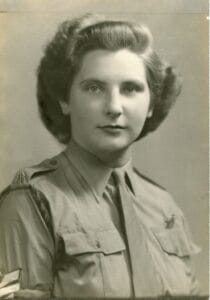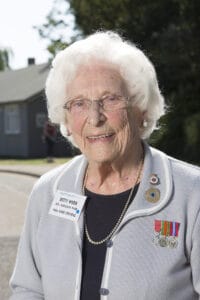After an “idyllic” childhood growing up in Richard’s Castle, a village on the border of the counties of Herefordshire and Shropshire in England, Webb was studying at Radbrook College in Shrewsbury at the start of World War II. As soon as she turned 18 in 1941, she signed up to join the Auxiliary Territorial Service as “I wanted to do something more for the war effort than bake sausage rolls.” She was sent for basic training, where it was learned that Webb was not only intelligent, but was fluent in German since her mother had wanted her to be “comfortable” when traveling on the continent, she was sent to interview in London, and quickly assigned to Bletchley Park in Buckinghamshire. She had never heard of Bletchley Park, and had no idea what they did there, and wouldn’t until she was “given the Official Secrets Act to read by an Army captain with a handgun on his desk.” The document said that she could not discuss the work she did with anyone outside of her job for 30 years under pain of severe punishment.

Bletchley, of course, was England’s secret effort to break Germany’s Enigma code machine, which was finally accomplished by Alan Turing. She never met him, but recognized him as “as the poor man [who] had asthma and used to cycle to work with a gas mask on.” Webb’s first job was “clerical, transcribing messages for the officers. But I soon began cataloguing the intercepted encrypted messages of the German military police, Army and SS, then logging them meticulously on index cards which I stored in a shoebox.” Perhaps boring, but she “came to realize it was vital because so much intelligence could be deduced from patterns and groupings.”
Once she proved herself adept, “I was moved onto more challenging work in the Japanese Military Section.” Her job there was “paraphrasing” — rewriting the intercepted messages while keeping the critical information intact so that if there was a spy on the inside who saw such a message, it would be harder to figure out its specific source, alerting the enemy to a compromised communications channel. “The messages, for instance, might be about a planned bombing of Burma, so I would find a way to relay this information discreetly. I found this much more fulfilling and was seemingly good at it.” So good that when Germany surrendered in May 1945, she was sent to continue her work at the Pentagon in Washington D.C. She was the only such member of the staff to be posted to Washington. “Like Bletchley, the social life was also brilliant and I spent my evenings attending cocktail parties, concerts and the ballet,” she said — “and learning how to use a jukebox!” She celebrated the end of the war in Washington.

After the war was over and she went home, she still couldn’t discuss her work — the 30-year prohibition and all — “but I think my father had an inkling.” She took a job as a secretary at a grammar school, and recognized the head teacher as a fellow Bletchley worker, “although of course we never spoke about it.” Once the secrecy requirement expired in 1975 and Bletchley’s role became known, “I was persuaded to write a memoir, No More Secrets [Amazon*], which she found “terribly tricky” because “I had become used to keeping it to myself.” And once she started talking, she talked, giving more than 200 speeches, including, starting in 2020, as an ambassador of Operation Bletchley, which raises money for the Army Benevolent Fund.
In 2023, she was invited to King Charles’s coronation — and was seated in the front row. It was the week before her 100th birthday; that celebration was held at Bletchley Park. “My life has been extraordinary,” she said in November. “I have an MBE [Most Excellent Order of the British Empire, in her case “for services to remembering and promoting the work of Bletchley Park”] and also the Légion d’honneur, the highest honor from France, which arrived in the post one day in 2021. But mainly I have my memories, and it’s all thanks to Bletchley.” Charlotte Elizabeth “Betty” Vine-Stevens Webb died March 31, at 101.
